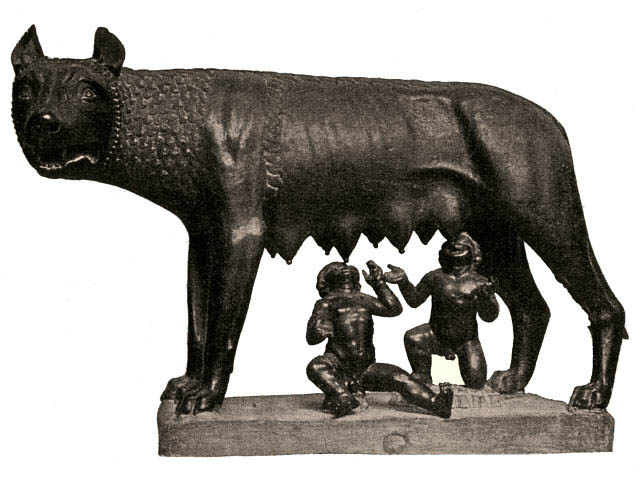The Foundation of Rome
The traditional date for the founding of Rome is April 21st, 753 BC.
 The traditional date for the founding of the greatest city of the Western world was the product of guesswork by Roman writers of the late centuries BC, working backwards from their own time. There were reports of kings of Rome in the early days before the last of them, Tarquin the Proud, was expelled and the Roman Republic was founded, which was believed to have happened in 510 BC. Allowing for the reigns of Tarquin's predecessors carried the calculation back some two to three hundred years. After ranging shots by various writers, the author Varro, greatly respected for his learning in the first century BC, settled on the year 753, which became the accepted, official date. All subsequent dates were expressed ab urbe condita, 'from the city's founding'.
The traditional date for the founding of the greatest city of the Western world was the product of guesswork by Roman writers of the late centuries BC, working backwards from their own time. There were reports of kings of Rome in the early days before the last of them, Tarquin the Proud, was expelled and the Roman Republic was founded, which was believed to have happened in 510 BC. Allowing for the reigns of Tarquin's predecessors carried the calculation back some two to three hundred years. After ranging shots by various writers, the author Varro, greatly respected for his learning in the first century BC, settled on the year 753, which became the accepted, official date. All subsequent dates were expressed ab urbe condita, 'from the city's founding'.
The story of the founding also went through variations. Roman tradition ascribed it to Romulus, whose name means simply 'man of Rome', but Greek writers from at least the fifth century BC attributed it to the Trojan exile Aeneas. By the first century BC the two versions had coalesced. After the fall of Troy (conventionally dated to 1184 BC), Aeneas went to Central Italy and married Lavinia, the daughter of the local king, Latinus. From them sprang a line of kings who ruled Alba Longa (twelve miles south-east of Rome) down to Numitor, whose throne was usurped by Amulius, his younger brother. Amulius forced Numitor's daughter Rhea Silvia to become a Vestal Virgin, so that she would bear no children to challenge him. Rhea Silvia, however, was raped by the war god, Mars - or so she said, as the historian Livy cynically remarked - and bore twin boys, Romulus and Remus (or Romus).
The wicked Amulius had the babies set afloat on the Tiber, but they were miraculously washed up beneath a fig tree, called Ruminalis, near the Palatine Hill. There they were suckled by a she-wolf and, according to one version, a woodpecker helped to feed them: both the wolf and the woodpecker were beasts of Mars. Later the children were cared for by a shepherd and his wife.
They were not sons of the war god for nothing and they grew up bold, vigorous and the leaders of the local shepherd boys. Presently the twins killed Amulius, put Numitor back on his throne and set out to found a city of their own, but they quarrelled over the exact site. Romulus chose the Palatine Hill and Remus the Aventine. Romulus began building a wall, but Remus contemptuously jumped over it, at which the furious Romulus killed him.
To secure the new settlement's future population, Romulus organised the rape of the Sabine women. After a reign of forty years or so, he mysteriously disappeared in a violent thunderstorm, perhaps whirled up into the sky to join the gods.
The first small settlements on the Roman hills have been dated by archaeologists to the tenth century BC, well before the traditional date, but the story is revealing about Roman attitudes under the Republic and the Empire. They considered Mars an appropriate patron and they liked to see destiny and a divine intelligence at work in their origins. They held the sacred Ruminalis fig tree in respect and the nearby Lupercal cave was pointed out as the she-wolf's lair. The wolf may be a legacy of early Rome's debt to the Etruscans, who seem to have had a legend of a she-wolf fostering children.
The Etruscans dominated Central Italy from the Po valley down to Campania by the seventh century BC. They were strongly influenced by Greek culture, their city-states were ruled by kings and their territory included Rome until it shrugged off the Etruscan yoke. Looking back from about 50 BC, Cicero praised the 'almost unbelievable foresight', 'admirable prudence' and 'god-like skill' with which Romulus chose the site for the capital of a world empire, advantageously placed for trade, readily defensible and well provided with natural springs.
He may have exaggerated the case, but early Rome was in truth a focus of important routes by land and water, set some fifteen miles inland from the Mediterranean at the first point where the River Tiber was narrow enough to be bridged, yet still navigable by sea-going ships. Even Livy thought that 'the fates ordained the founding of this great city and the beginning of the world's mightiest empire, second only to the power of the gods.'



![‘Scientific Researches! New Discoveries in Pneumaticks! [sic] or an Experimental Lecture on the Powers of Air, May 23, 1802’, by James Gillray. Minneapolis Institute of Art. Public Domain.](/sites/default/files/styles/teaser_list/public/2025-03/lecture_history_today_0.jpg?itok=mHN_obPV)
